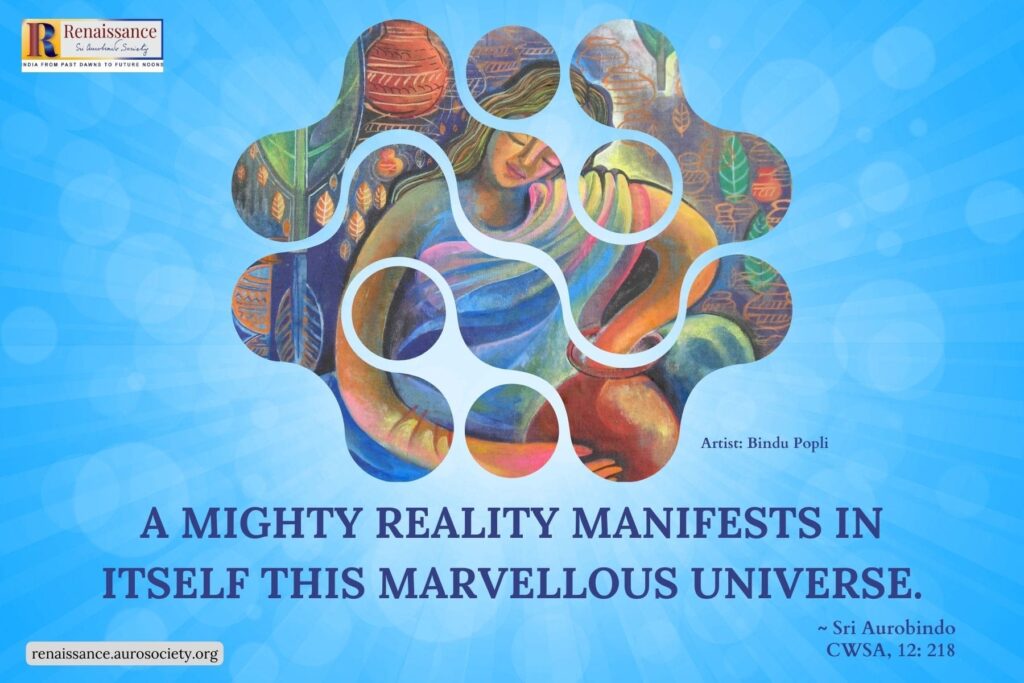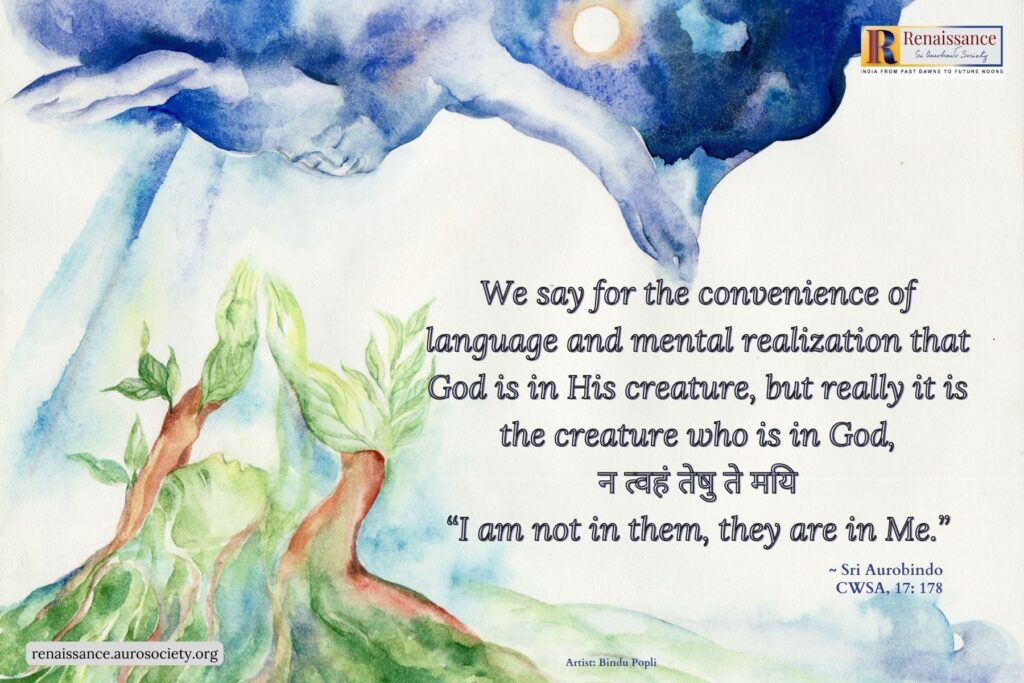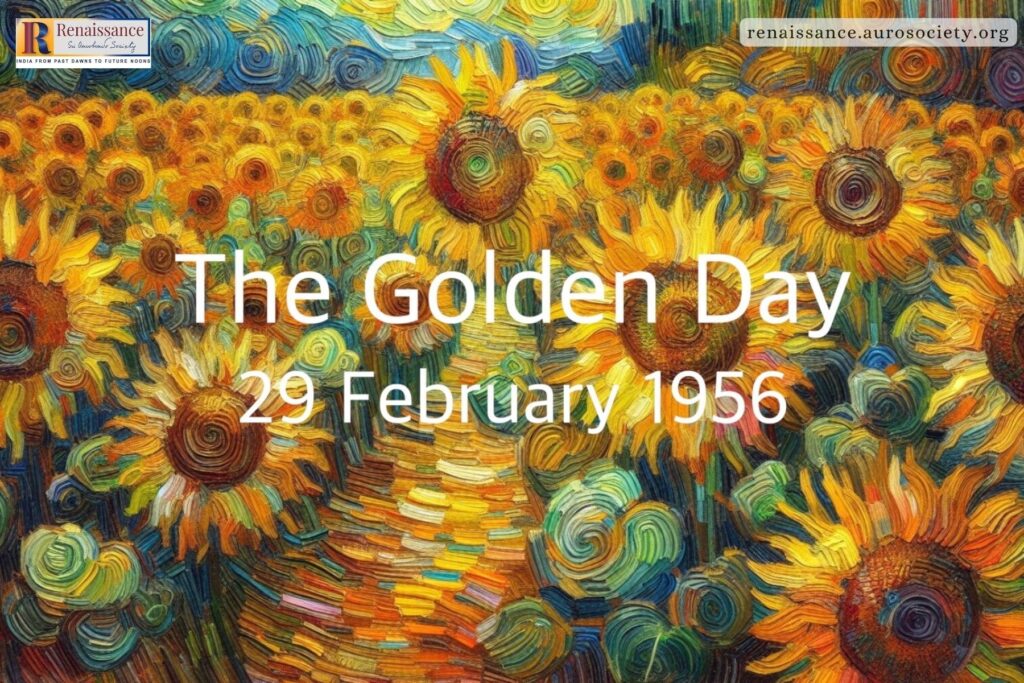CONTINUED FROM PART 3
SPIRITUAL PHILOSOPHY OF SRI AUROBINDO
Let us now pass from the matchless grandeur and sublimity of the seer-vision of the mystic poet to the luminous intellectual interpretation of the spiritual philosopher. Here too, the keynote is the same – the same boundless, fathomless love for man and earth.
“It is a perfected and divinised life for which the earth-Nature is seeking, and this seeking is a sign of the Divine Will in Nature.” (CWSA, Vol. 22, p. 708)
That this seeking is universal in earth-Nature, whether it is conscious, as in man, or subconscious, as in animals and plants, is proved by the ascending scale of life itself. The steps of evolution are the steps of a progressive divinisation and perfection. But what is it that evolves? What is it that expresses itself in a developing diversity of forms, releasing more and more of its light and power, beauty and harmony through the wrestle and embrace of incalculable elements?
Ancient spiritual knowledge envisages an involution preceding evolution and containing, as in a seed, all that emerges stage by stage, into Time-Space relations. Like all biological birth and growth, evolution presupposes something which is pregnant with unlimited possibilities of self-creation and self-expression. That something cannot be a void, for no void can evolve out of itself a teeming universe of names and forms.
It cannot be an inconscient and mechanical Nature either, for the order and rhythm we see in the movements of the material world, the subtle, intricate, marvellous mechanism of the living bodies and the light of intelligence that shines out in man and the will to self-transcendence and the realisation of the Infinite and Eternal, which characterises a crucial stage of his evolution, cannot surely be the creation of a blind Nature proceeding by freaks and chances.
What is really involved here in Matter is no other than Spirit Itself, Sachchidananda, the infinite Existence-Consciousness-Bliss. And if this ancient Vedantic knowledge is once accepted, the theory of evolution puts on an altogether different aspect: the complete emergence of the triune glory of Sachchidananda becomes then the inevitable end of evolution.
It is this spiritual knowledge, this mystic vision of the ultimate destiny of man and earth that ensouls Sri Aurobindo’s words and imparts to them a compelling tone of inspiration. And it is his spiritual self-identification with man and earth, an identification which is included in his self-identification with the omnipresent Reality, the Infinite One, that is the source of this knowledge and the immeasurable love we find in him.
It would be wrong to think that Sri Aurobindo’s love for the Divine and his love for man and earth are two different loves, one superior and the other inferior, one spiritual and the other secular. They are one and the same love, unvarying, unebbing, for the Supreme Being in His transcendence, universality and individuality, and for the Supreme Being in Matter as well as in Spirit, in darkness and death as well as in Light and immortality.
Not proceeding by faith, but by the self-existent light of Knowledge, his love does not fumble or falter, but acts by the calm self-effectuating Will of the Supreme Force. It knows that
…if Brahman has entered into form and represented Its being in material substance, it can only be to enjoy self-manifestation in the figures of relative and phenomenal consciousness. Brahman is in this world to represent Itself in the values of Life. Life exists in Brahman in order to discover Brahman in itself.
Therefore man’s importance in the world is that he gives to it that development of consciousness in which its transfiguration by a perfect self-discovery becomes possible. To fulfil God in life is man’s manhood. He starts from the animal vitality and its activities, but a divine existence is his objective.
(CWSA, Vol. 21, p. 41)
In a packed formula of revealing wisdom, Sri Aurobindo gives the central aim and sense of human life:
If there is a Being that is becoming, a Reality of existence that is unrolling itself in Time, what that being, that reality secretly is is what we have to become, and so to become is our life’s significance.
(CWSA, Vol. 22, p. 1052)
CONCLUSION
The above exposition makes it abundantly clear that Sri Aurobindo’s love for man and earth is not derived from any humanism that dotes upon man as he is, a groping and stumbling creature of Nature, and commands no vision of the Divinity labouring for a perfect self-expression in him.
Humanism confines itself to the removal of man’s superficial wants, economic, social and intellectual, and ignores the one thing essential – the development and perfection of his central being, the soul. It bestows considerable care on the crust and leaves the core to starve. And no wonder, it fails to make man happy; for enduring and invulnerable happiness inheres in the soul of man and cannot be a gift to him from outside.
The greatest benefactor of man is, therefore, he who helps him discover his soul and the Godhead within it, and realise the infinite Light, Power and Bliss of his immortal spiritual existence. Is it a too long-term remedy for the present, pressing ills of life?
But have not all short-time panaceas failed, and failed lamentably? Have they not ended by aggravating and complicating the very maladies they set out to cure? Unless and until the Divine in man is awakened and made dynamic in his life, the beast in him will riot unbridled in its congenial darkness.
We have seen that Sri Aurobindo’s love for man and earth is not humanism, idealistic or realistic; it is not an outcome of an emotional or imaginative idealism, nor an overflow from the widened heart of Spirit-touched sainthood. It is more than compassion and more than even the spiritual emotion born of inner identity.
It is a beatific blossom of a complete and constant identification with the Divine who is everywhere, in Matter and Life as much as in the silent Spirit; and it is this union and identification that makes Sri Aurobindo declare in the inspired strain of the Vedic Rishis, “Matter is Brahman“. (CWSA, Vol. 21, p. 338)
“Matter is Sachchidananda represented to His own mental experience as a formal basis of objective knowledge, action and delight of existence.” (ibid., p. 253)
“The animal is a living laboratory in which Nature has, it is said, worked out man. Man himself may well be a thinking and living laboratory in whom and with whose conscious co-operation she wills to work out the superman, the god. Or shall we not say, rather, to manifest God? For if evolution is the progressive manifestation by Nature of that which slept or worked in her, involved, it is also the overt realisation of that which she secretly is.” (ibid., p. 6)
Sri Aurobindo’s love for the omnipresent Divine and the Divine’s love for His creatures are fused in one omniscient Force whose very breath is benediction and whose touch a new birth and transfiguration. Nothing short of this divine Love, this “fire-passion of Grace” (CWSA, Vol. 2, p. 564), could have undertaken the hitherto unattempted task of the radical transformation of human nature by a conversion and illumination of the Subconscient and the Inconscient upon which it stands as its base.
Nothing short of this all-knowing and all-achieving Love could have made Sri Aurobindo descend from the Sun-glory of the Supermind into “the dumb earth’s dreadful heart” and walk “in the bottomless pit”, so that Heaven’s fire might be “lit in the breast of the earth, and the undying suns here burn.” (ibid., p. 537)
We associate sacrifice and martyrdom with spiritual greatness, but where, in history, is there a parallel to this absolute sacrifice, not achieved for once in a supreme moment of divine impulsion, but resolutely continued from day to day, from year to year, nay, from life to life, in a grim fight with Death and Falsehood and Ignorance and Suffering in the darkness of the Subconscient and the Inconscient, so that the earth, washed of all ills, may beam with Heaven’s Light and man, reborn in God and remade in His image, may manifest His Love and Truth and immortal Bliss upon earth?



